Earthjustice advocacy at Michigan’s public service commission is shutting down dirty fossil fuel energy and making the state a clean energy leader.
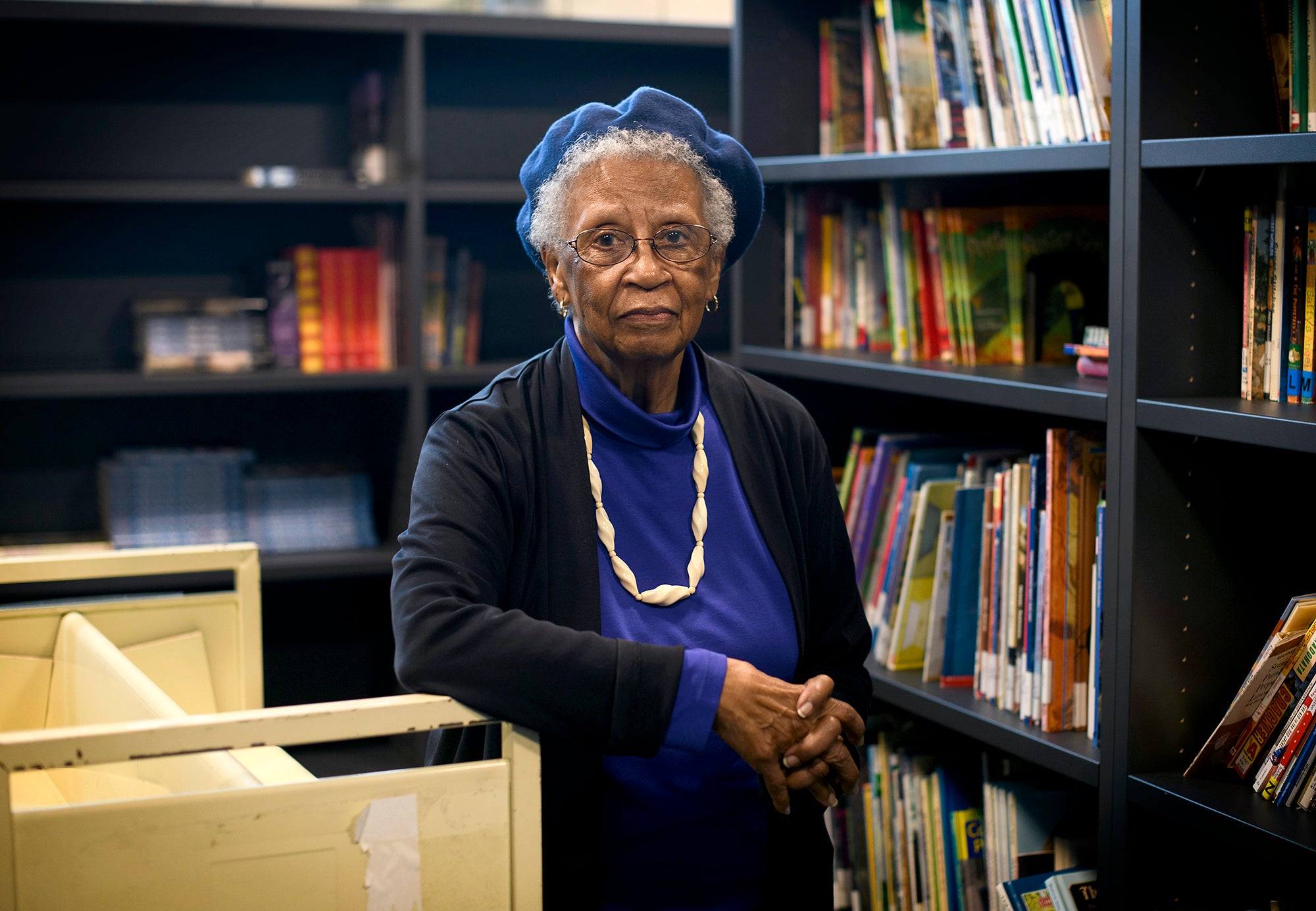
What to know:
- Local activists teamed up with Earthjustice to make big progress against polluters in Michigan.
- The state is now on track to close its last coal plant by 2032 and lead the clean energy transition nationwide.
- Many of these wins took place at the public service commission, a key venue for climate progress.
For decades, residents of River Rouge, Michigan, have been under siege from sometimes dangerous — and often dirty — industries. Marathon Petroleum, U.S. Steel, DTE Energy. These titans help power our homes and facilitate our relatively comfortable lives.
But they’re also the culprits of deadly pollution that has made ZIP code 48217 and the surrounding community one of the state’s most polluted areas. This contamination shows up in many ways, from oil-slicked rivers and soot-stained vehicles, to burning lungs and lost opportunities.
“Every morning waking up, I could see a red or orange sky. And I thought it was normal,” says Dr. Dolores Leonard, who grew up in River Rouge. “And it wasn’t until I was in my early 30s that I realized that it was not normal, and that what was happening was pollution coming from industry.”
Since the late 1990s, Leonard has been part of a broad coalition pushing to rein in the area’s top polluters. Thanks in large part to Earthjustice’s relentless advocacy in front of the public service commission, a government agency that regulates utilities, Michigan is now on track to both close its last coal plant by 2032 and lead the clean energy transition nationwide. Across the U.S., Earthjustice is advocating on behalf of communities to advance clean energy and climate solutions at these state-level commissions. River Rouge’s wins show what progress can look like.
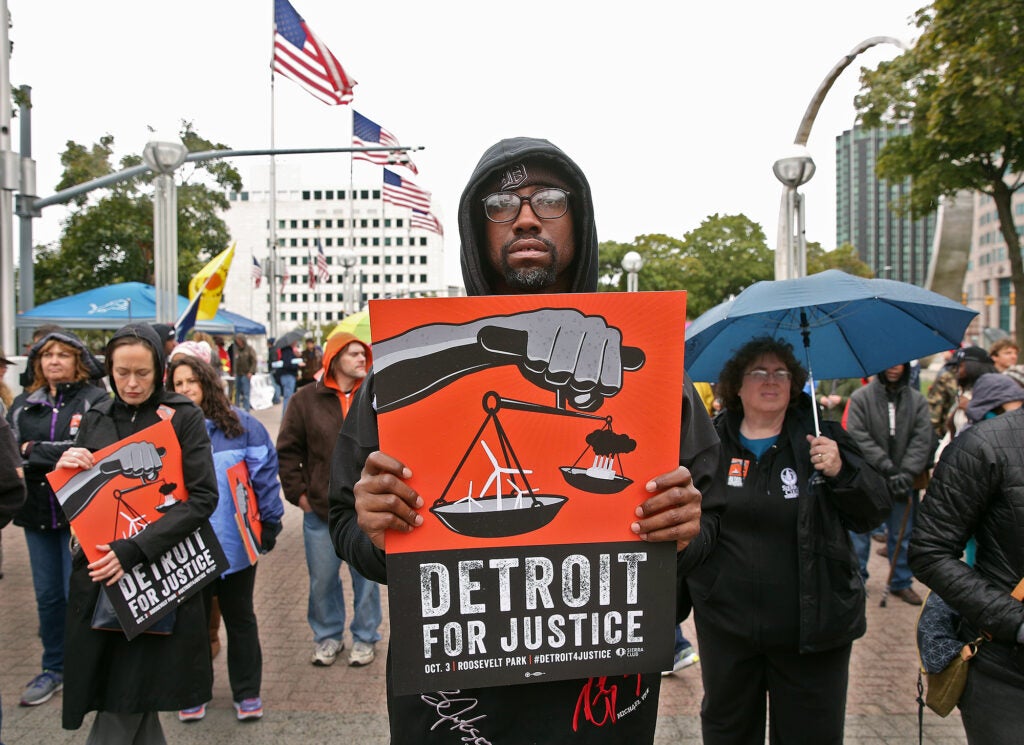
People taking part in the Detroit March for Justice in 2015 hold signs advocating for environmental justice. (Rex Larsen / AP Images for Sierra Club)
The broader community of people in ZIP code 48217 have had to fight for their right to breathe clean air and drink clean water for decades.
In the early 20th century, this area of southeast Michigan was primed for industrialization. Ships ferried coal along the Detroit River from the mines of the eastern United States, and the iron ore of the Upper Peninsula was near at hand. Factories, steel mills, and auto giants soon arrived.
Beginning in the 1920s, Black families from the Deep South began a mass exodus to the Midwest, fleeing racial violence in search of a better life. But soon they were subjected to a different, slower kind of violence, as federal redlining practices pushed Black people into specific areas, which were then zoned for even more polluting industries. It wasn’t long before toxic pollutants linked to cancer and other chronic diseases from the various dirty industries began to take their toll.
Every morning waking up, I could see a red or orange sky. And I thought it was normal.
For years, people like Leonard have raised concerns to government regulators, city leaders, and the companies themselves about the pollution. And for years, they’ve been ignored and condescended to. In the early 2000s, for example, after a salt mine company began detonating fuel and fertilizer underground to search for briny deposits within the neighborhood, Leonard and others brought their concerns about the explosions to the city of Detroit. During a community meeting, a city representative insisted that any damage to their homes or booming sounds that the residents were hearing were likely from existing truck traffic, not the mine explosions.
“We asked him to sit down,” recounts Leonard. “He was basically telling us what we are accustomed to being told…that we are not intelligent enough to understand the situation.”
During this time, Leonard met Rhonda Anderson, a resident of the area and longtime environmental justice activist. At the time, Anderson was working for the Sierra Club, which in 2010 intervened in a federal Clean Air Act case brought by the Department of Justice against DTE Energy for violating the Clean Air Act at one of its coal units. That lawsuit soon expanded to include other DTE coal units. In 2012, Earthjustice began representing the Sierra Club in the case, with attorney Shannon Fisk leading the litigation.
“He was basically telling us what we are accustomed to being told…that we are not intelligent enough to understand the situation.”
Over about a decade, Earthjustice and coalition members made countless court filings and attended numerous meetings with state and federal regulators, company officials, and technical experts sparring over complex pollution modeling numbers and extensive legal arguments. But as a longtime attorney who once toppled a giant coal plant in Kentucky and helped pave the way for that state’s first large-scale solar farm, Fisk was no stranger to adversity.
“Most of what was going on was so far above my head,” says Anderson, but “Shannon threw down.”
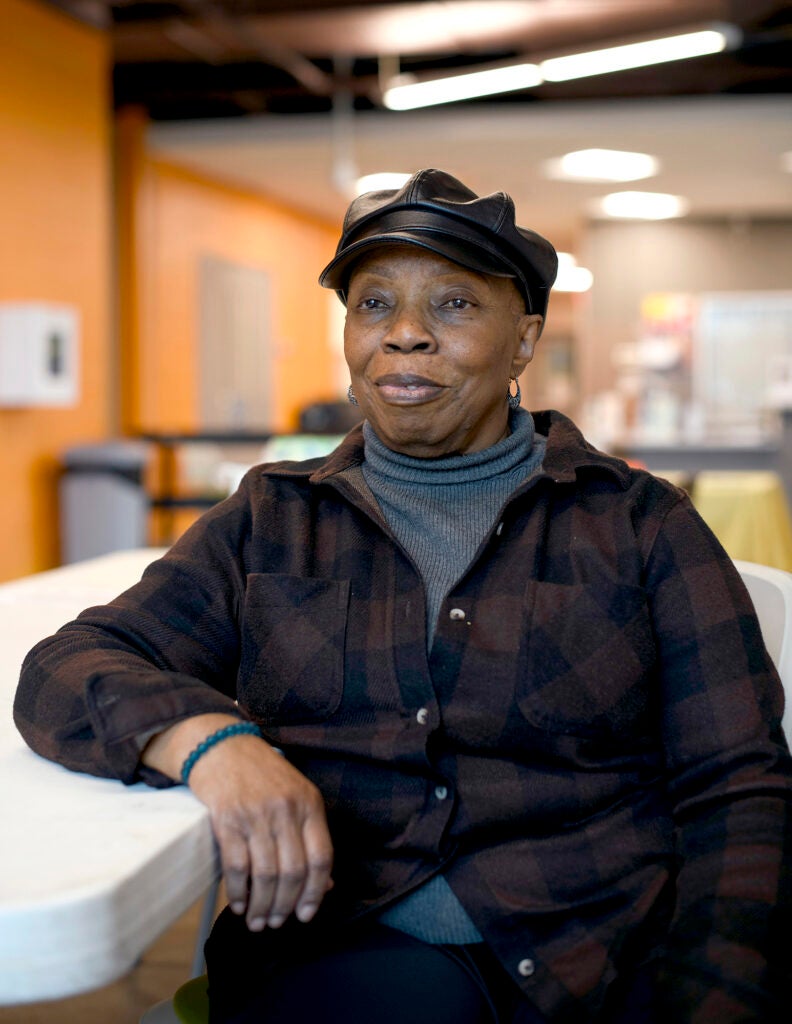
Rhonda Anderson (Brittany Greeson for Earthjustice)
At the same time, Earthjustice and the coalition were challenging the utilities at the Michigan Public Service Commission. In each U.S. state, these commissions regulate utilities, determining the cost of electricity bills as well as whether power comes from dirty or clean energy sources.
Utilities like DTE, long one of the worst climate polluters in the country, too often argue for dirty fossil fuels over renewables to maintain their monopolies and corporate profits. And well-resourced utilities can afford to hire experts and lobbyists to help them make their case. Earthjustice is one of the few organizations with the expertise to challenge the utilities. We represent community groups, advocating for commissioners to choose clean, energy efficient solutions that yield economic and environmental benefits for everyone.
In Michigan, this tireless legal wrangling began to turn the tide.
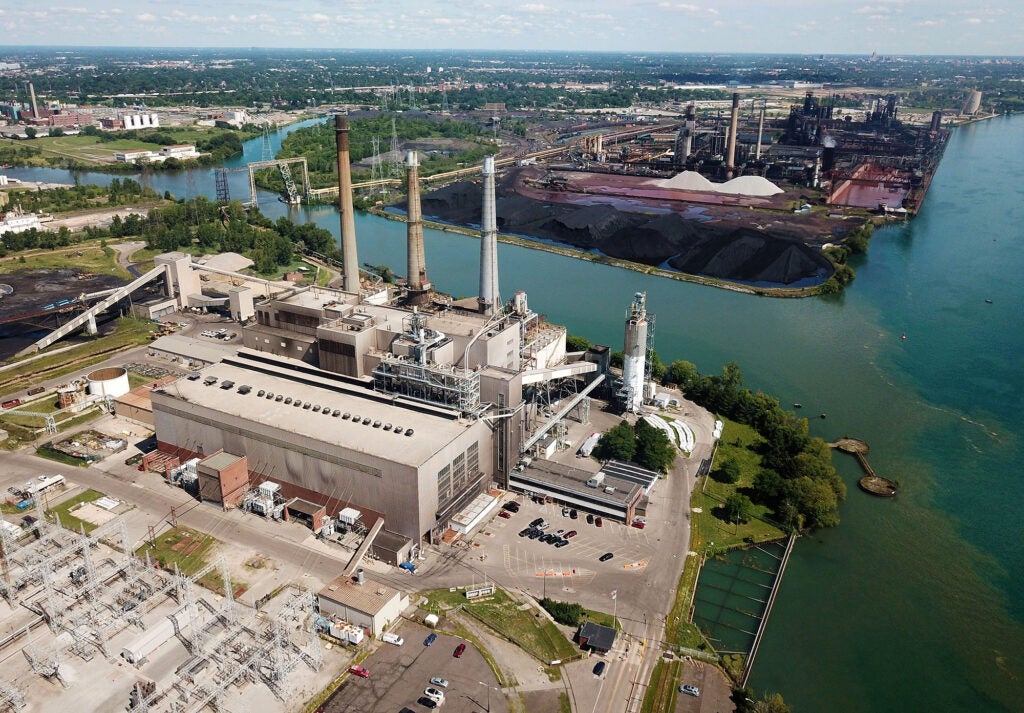
The now-closed DTE Energy River Rouge plant in the foreground, with the EES Coke Battery facility on Zug Island in the background. The facilities are located near the overburdened River Rouge community and the state’s most polluted zip code, 48217. (Ted Auch / FracTracker Alliance)
In 2020, the federal government secured a settlement with DTE that required the company to clean up or shut down three of its coal plants. And a separate agreement between the Sierra Club and DTE, negotiated by Earthjustice, committed the company to retire those coal plants and provide $2 million for community-selected projects to improve environmental health in 48217 and River Rouge.
“Amidst the COVID-19 pandemic, this settlement agreement couldn’t have come at a more crucial time for Michigan communities,” says Anderson.
In 2022 and 2023, Earthjustice and its allies won some of its biggest fights yet at the utility commission. A July 2023 settlement agreement with DTE, along with a 2022 settlement with Michigan’s other major utility Consumers Energy, puts the state on track to end coal burning for electricity in less than a decade. The DTE settlement includes retiring the Monroe coal plant – the third largest in the nation – eight to 12 years earlier than previously planned, accelerating the build out of clean energy to replace that plant, and shutting down a gas-fired peaker plant in River Rouge in 2024. Finally, DTE will direct an additional $70 million in energy efficiency funding towards income-qualified customers to help address the increasingly high energy burdens faced by ratepayers in Michigan.
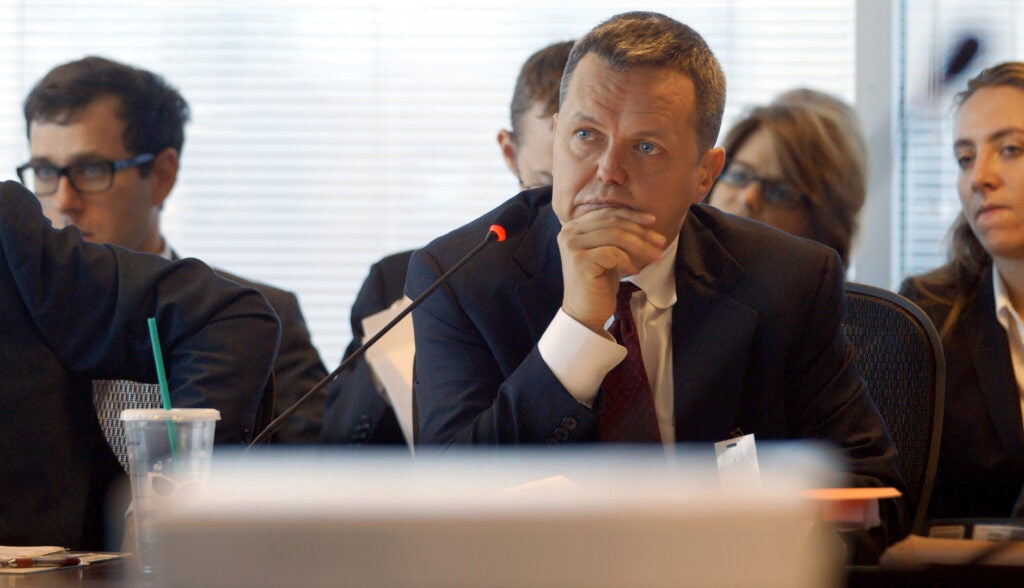
Earthjustice attorney Shannon Fisk (center) at a public utility commission proceeding. (Years of Living Dangerously)
In late 2023, Michigan signed into law a historic climate package that will solidify and enable us to build on many of the measures outlined in the coalition’s settlements, including funding for electrification, low-income energy efficiency, and workforce development.
Meanwhile, Leonard is busy ensuring the implementation of the various projects outlined in the settlement agreements, including new water and air filtration systems installed throughout the community. At the same time, Earthjustice is working closely with the utilities as they roll out programs to repair and upgrade homes in the community to make them safer and more energy efficient. It’s a paradigm shift to get the utilities to think more about saving energy, rather than just profiting from its use.
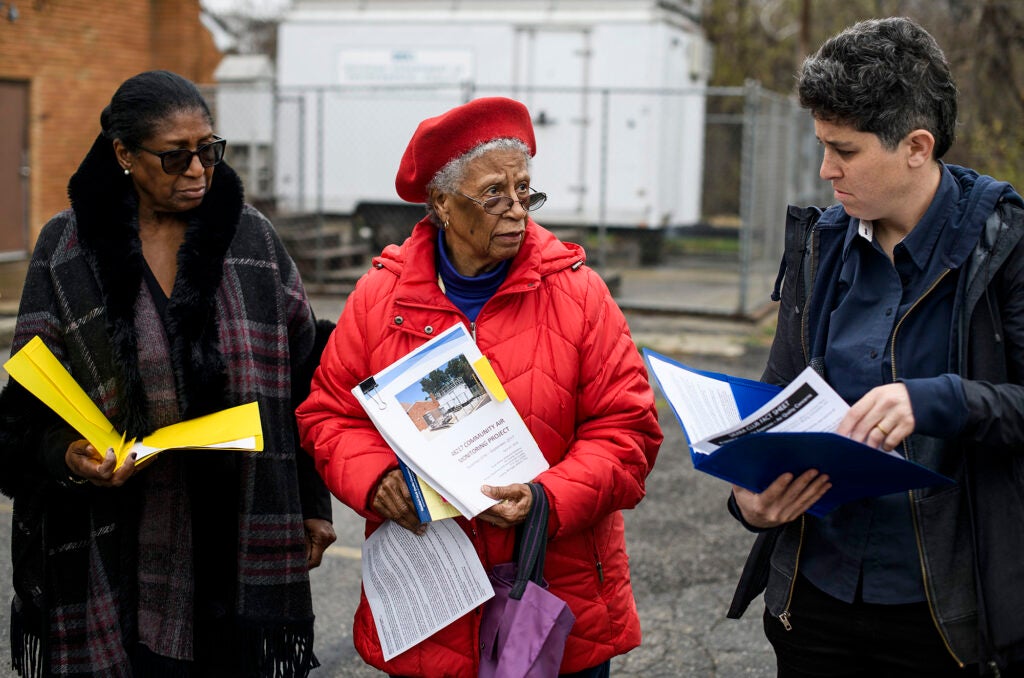
Dr. Dolores Leonard, center, speaks at New Mt. Hermon Church in the 48217 ZIP code, where there is an air quality monitor. The stop at the church was part of a tour of toxic sites located throughout Southwest Detroit, Ecorse, and River Rouge. (Brittany Greeson for Earthjustice)
Leonard knows there’s a long way to go, especially as she teams up again with Earthjustice in a new fight against a coke oven facility owned by DTE that is illegally dumping harmful air pollution into the community.
But as Leonard says, “Local regulators and city leaders know ZIP code 48217, and they know we won’t stop fighting.”
Make a monthly gift today and your contributions will be matched $1:$1 for 12 months!



